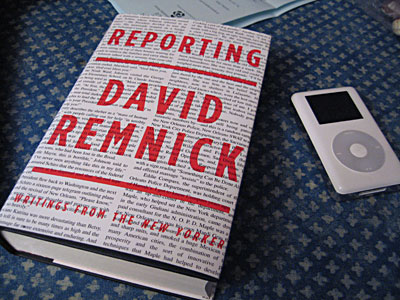The best bit of video coverage to emerge from last week’s Tory Conference wasn’t shot by a TV cameraman or broadcast by a TV station. It was filmed by Dan Chung, probably on a digital still camera — and published by a newspaper: the Guardian! Sacre bleu!
Attn. lottery winners: Leica M8 video tour
If that £2990 is burning a hole in your pocket, you can always console yourself with this solemn advance tour.
For another £15k you could have this 39 megapixel monster from Hasselblad:

But then you’ll need a lot more RAM — each image takes up about 110 MB. It’s almost enough to drive one back to what my Open University colleague Steve Edwards calls “chemical photography”.
Googleplex working overtime?
From Good Morning Silicon Valley…
What kind of a sweatshop are they running over there at Google? Just this week, the elves in the trenches have made Google Gadgets available for addition to any site, launched its Literacy Project in conjunction with LitCam and UNESCO, were apparently caught teaming up with Apple on a possible hookup of Google Maps with iPhoto, added another new batch of imagery to Google Earth, and now have released Code Search, a tool for programmers to dig through publicly available source code. (From the Unintended Consequences Department, the search engine also lets you find things like serial number generating algorithms.) That’s just this week, and it still has a day to go. Gee, I hope they’re paying those folks enough.
But, later, there’s this
The L.A. Times reports company execs have launched an initiative called “Features, Not Products,” telling engineers to stop launching so many services and focus on making the existing ones work together better. Co-founder Sergey Brin said it occurred to him this summer as he scanned the 50 or so products available across the company’s Web sites that users were probably getting overwhelmed. “It’s worse than that,” he said. “It’s that I was getting lost in the sheer volume of the products that we were releasing.” Simplicity was among the things that made Google so popular, and its success led it to snap up hundreds of smart, ambitious software engineers. “The result occurred precisely because we told these incredible engineering teams to run as fast as possible to solve new problems,” said Chief Executive Eric Schmidt. “But then that created this other problem.” Analyst Rob Enderle puts it another way: “They created a bunch of crap that they have no idea what to do with. What a huge waste of resources.” Schmidt says the plan is to make Google products easier to use by packaging services, citing plans to combine the company’s spreadsheet, calendar and word-processing programs into one suite of Web-based applications. “That is a big change in the way we run the company,” Schmidt said, describing Google’s previous attitude as, “Just get this stuff built and get it out — don’t worry about the integration.”
Quote of the Day
“When in doubt, tell the truth.”
Mark Twain.
Using Wiki in Education
The archive site of an interesting symposium on using Wikis in Education. Very relevant to some of the work I’m doing just now. Only problem is that only abstracts are available on the site for most of the presentations. Bah!
Thanks to Gill Needham for the link.
Lightning

A friend sent me this as an attachment. No idea who took it, or where.
Computerised hostility detection
Fascinating article in today’s New York Times…
WASHINGTON, Oct. 3 — A consortium of major universities, using Homeland Security Department money, is developing software that would let the government monitor negative opinions of the United States or its leaders in newspapers and other publications overseas.
Such a “sentiment analysis” is intended to identify potential threats to the nation, security officials said.
Researchers at institutions including Cornell, the University of Pittsburgh and the University of Utah intend to test the system on hundreds of articles published in 2001 and 2002 on topics like President Bush’s use of the term “axis of evil,” the handling of detainees at Guantánamo Bay, the debate over global warming and the coup attempt against President Hugo Chávez of Venezuela.
A $2.4 million grant will finance the research over three years.
American officials have long relied on newspapers and other news sources to track events and opinions here and abroad, a goal that has included the routine translation of articles from many foreign publications and news services.
The new software would allow much more rapid and comprehensive monitoring of the global news media, as the Homeland Security Department and, perhaps, intelligence agencies look “to identify common patterns from numerous sources of information which might be indicative of potential threats to the nation,” a statement by the department said.
It could take several years for such a monitoring system to be in place, said Joe Kielman, coordinator of the research effort. The monitoring would not extend to United States news, Mr. Kielman said.
“We want to understand the rhetoric that is being published and how intense it is, such as the difference between dislike and excoriate,” he said.
Even the basic research has raised concern among journalism advocates and privacy groups, as well as representatives of the foreign news media.
“It is just creepy and Orwellian,” said Lucy Dalglish, a lawyer and former editor who is executive director of the Reporters Committee for Freedom of the Press.
Andrei Sitov, Washington bureau chief of the Itar-Tass news agency of Russia, said he hoped that the objective did not go beyond simply identifying threats to efforts to stifle criticism about an American president or administration.
“This is what makes your country great, the open society where people can criticize their own government,” Mr. Sitov said…
BTW: “Sentiment analysis” is what this stuff is called in the comp.sci community.
The pleasures of Amazon

When I got back from work today, the postman had delivered two delights. One is this collection of David Remnick’s journalism. He’s such a graceful writer — the kind that leaves you staring at a sentence and wondering how anything can be so succinctly elegant.

The other delight is Bob Dylan’s new album, Modern Times. It’s astonishingly original and fresh, with some tracks (Thunder on the Mountain, The Levee’s Gonna Break) which remind one of why rock music changed the world.
The CrackBerry habit
British employers are being warned they could face multi-million-pound legal actions from BlackBerry-addicted staff on a similar scale as class law-suits taken against tobacco companies.
Research by the University of Northampton has revealed that one-third of BlackBerry users showed signs of addictive behaviour similar to an alcoholic being unable to pass a pub without a drink.
The report found that some BlackBerry users displayed textbook addictive symptoms – denial, withdrawal and antisocial behaviour – and that time with their families was being taken up with BlackBerry-checking, even at the dinner table.
Professor Nada Kakabadse, joint author of the study, said that lawsuits were a growing issue for employers who were being sued for failing in their duty of care to staff and in following health and safety guidelines.
In one case in the US, a female business consultant claimed that her marriage fell apart because she was constantly checking messages. She ended up losing custody of her children and sued her employer for damages.
“Enlightened companies that issue BlackBerrys as standard like pen and paper should also have policies on how to use them, so that people can use technology in a way that doesn’t have an addictive side,” said Professor Kakabadse of Northampton Business School.
The BlackBerry backlash has already begun in the US, where firms are settling out of court to avoid negative publicity.
[Source.]
I’ve had a BlackBerry for well over a year. It is by far the most useful gadget I’ve ever owned. But I don’t recognise any of these symptoms. Could it be that most BlackBerry users haven’t figured out how to filter their mail? In my case, the only mail that reaches my phone comes from:
Everything else goes to my computer, as usual. The result: really important email reaches me instantly. Everything else has to wait until I’m at a computer.
Press the Space bar

This is from a series of images provided by NASA of the latest Shuttle mission. The laptop on the left looks like an IBM Thinkpad. Hmmm… wonder if it’s running XP.
